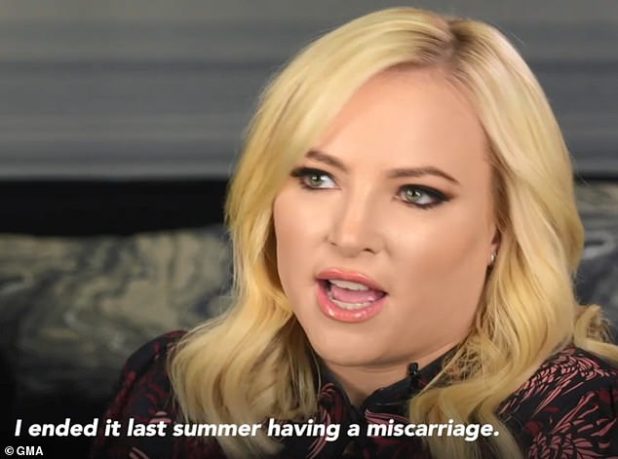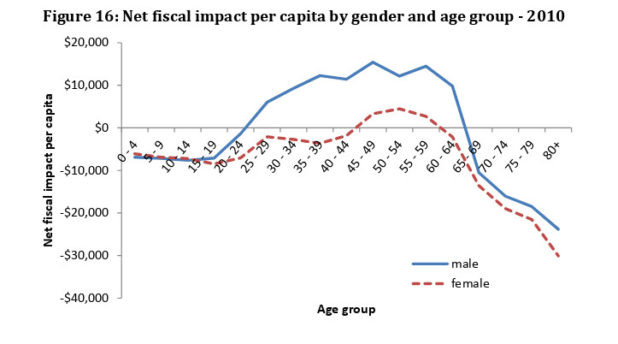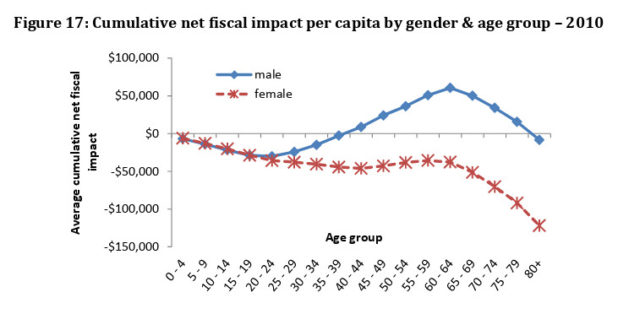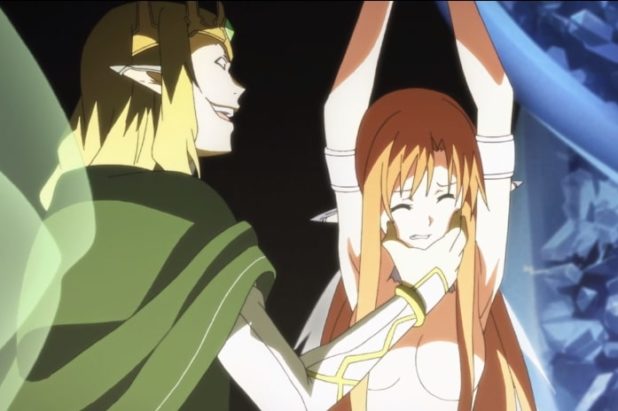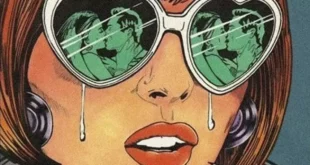Pomidor Quixote
Daily Stormer
October 31, 2019
It is funny because it is Meghan McCain. It is sad because it also is the average career woman.
Meghan McCain says she was ‘very, very, very hard’ on herself after suffering a miscarriage early this summer, and while she’s now learned to give herself a break, coping with the loss has still made her feel ‘very, very alone.’
Meghan, 35, and her husband Ben Domenech were expecting their first child earlier this year when she miscarried, and she went on to make headlines with a candid op-ed in the New York Times about her loss.
Speaking to Good Morning America today, The View co-host has gone into more detail about how she suffered, and explains why it’s so important to her to get more people talking about miscarriage.
How about we get less people talking about miscarriages by having more women make the most out of their fertile years instead of wasting them on college and random jobs?
‘Nobody likes the word miscarriage. I think there’s a lot of shame attached to it, and a lot of sadness, and there’s a lot of societal stigma about it, but I’d rather talk about it than not talk about it,’ she said.
When she miscarried, she said, ‘I felt so ashamed.’
‘I had to take time off of work … I still am worried that I, for whatever reason, maybe can’t be pregnant and do my job at the same time because I couldn’t before.
‘I was very, very, very hard on myself, and I blamed the stress of my life, and I blamed being older, and I blamed my personality, and I blamed things that were not rational,’ she went on.
Her feelings about it became more rational over time, but urged others to go easy on themselves, saying it’s ‘physically and emotionally just an an extremely intense and extremely difficult thing to go through.’
‘Since then I have tried to just go a little easier on myself in all things having to do with motherhood and pregnancy-related because it’s not easy being a woman. It’s just not.’
In fact, it actually should be very easy to be a woman. The easiest possible thing anyone can be, in actuality.
If you’re a woman, men are literally paying for you to exist and live this fantasy where you go out and do human stuff and everyone cheers.
Women smart enough to trade their teenage beauty for a wealthy man instead of wasting those years partying have it even easier.
I know what Meghan meant though. Women aren’t known to be the brightest of bulbs, and the media brainwashing power, more often than not, proves to be too strong for them to resist.
Meghan said before she got pregnant, she wasn’t even totally sure about having children, so she was surprised by how hard the loss hit her.
‘I’ve always been sort of agnostic about having kids,’ she said. ‘I don’t feel naturally maternal. I don’t feel this natural draw to motherhood. And I think my response and how sad I felt afterward surprised me.
‘It just hit me a lot harder than I thought it would. I never even thought about having a miscarriage. I never even thought about being pregnant until it happened,’ she went on.
Her maternal instincts were repressed and obfuscated before.
The average woman is displaying corrupted manifestations of her motherly instincts pretty much on a daily basis. From the way they treat their pets, to the emotions they experience when watching TV shows — nature is there, trying to make itself heard.
She argued that her job is a constant reminder that she miscarried.
‘Daytime TV is really hard to be childless and 35,’ she said. ‘Every day I’m reminded that I’m not a mom.’
Meghan said that she thinks fans of The View assume people on TV have perfect lives. But that’s not true, and she wants to be open about her experiences.
‘I just want people to feel less alone, because I felt very, very alone,’ she said.
‘I just think that people need to treat [miscarriage] the way that we treat any other kind of loss. But I also feel like as a society we are nowhere near where we need to be talking about grief and death and loss. It’s hard. It’s just really, really, really hard,’ she added.
‘And I empathize with all women who’ve gone through it. And who may go through it. It’s just horrific, and it doesn’t’ really get easier either.‘
…
‘My miscarriage was a horrendous experience and I would not wish it upon anyone,’ she wrote.
‘Since then, I have asked the same question every mother asks who loves and loses a child: Why? Why was this light and joy held before us, and then the world where this child drew breath cast into shadow? Why was an innocent life created in the image of God and then abruptly snuffed out?
Why? Because she’s just too old.
‘I blamed myself,’ she went on. ‘Perhaps it was wrong of me to choose to be a professional woman, working in a high-pressure, high-visibility, high-stress field, still bearing the burden of the recent loss of my father and facing on top of that the arrows that come with public life.
‘This, I told myself, is the reason my body is a rock-strewn wasteland in which no child may live. This is my fault.
‘Yet it is not my fault,’ she said,
‘I had a miscarriage. I loved my baby, and I always will. To the end of my days I will remember this child — and whatever children come will not obscure that. I have love for my child. I have love for all the women who, like me, were briefly in the sisterhood of motherhood, hoping, praying and nursing joy within us, until the day the joy was over.’
Of course it’s not her fault.
It’s the fault of men who didn’t rape her when she was a fertile teenager.
 Daily Stormer The Most Censored Publication in History
Daily Stormer The Most Censored Publication in History
